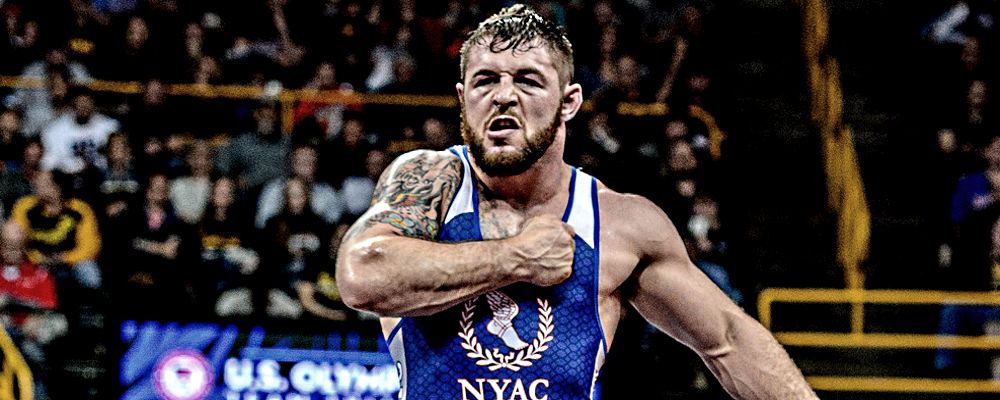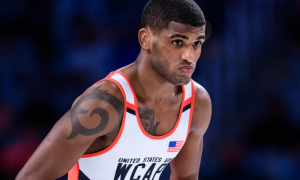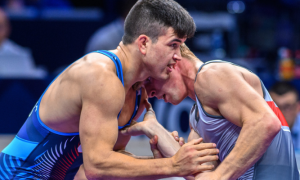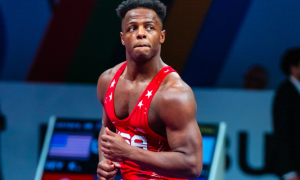Bruisers, the lot of them. That’s what 85 kg offers up at the Olympics in Rio. Sure, there are a few technicians to look forward to, but there’s also a couple of dudes here are much more comfortable lying in wait until it’s time to strike. On the other hand, this bracket might wind up looking like one long, drawn-out brawl. Other weight classes showcase more previous Olympians and World medalist-types, but 85 is going to be a place where tensions are going to heat up in a hurry, as everyone here likely feels they have something to prove.
One of the more decorated athletes to keep an eye on is Saman Tahmasebi (AZE, world no. 5). Rio marks the third consecutive Olympiad for the Persian-born Tahmasebi and at 31 years of age, he is a bit long in the tooth compared to most here. Not a problem. Tahmasebi actually might just be hitting his stride in a way, although he has been on the shelf since going up to 98 for the Golden Grand Prix back in November. He’s jumped up to 98 on several occasions, in fact, and has never really fared very well there. But when you take a gander at the way this guy is built, you can see why making 85 kilos is a probably a chore for him.
Tahmasebi has knocked on the door at the World Championships on three different occasions and for one reason or another, he hasn’t been able to open it. In 2013, Iran’s Taleb Nematpour broke his heart in the final (Tahmasebi repped the IRI up until half a decade ago). A year later, it was Melonin Noumonvi, the French hero, who squeezed past him for gold. And last September, Ukrainian assassin Zhan Belenyuk paid him back in the semifinals, although Tahmasebi eventually defeated Viktor Lorincz via a razor-thin 2-1 score to grab his bronze.
Can Tahmasebi get on a run here? Yeah, he could. Tahmasebi is somewhat aggressive on his feet — he’ll dig in and try to snatch arms and whatnot. Par terre-wise he’s a gut-first kind of guy but doesn’t demonstrate an overwhelming preference for either side. It’s hard to picture him moving into the medal rounds without having to post at least one, if not two dramatic wins and it is seriously up in the air if he’ll even the chance to do so. If he does, it might be smooth sailing from there on out.
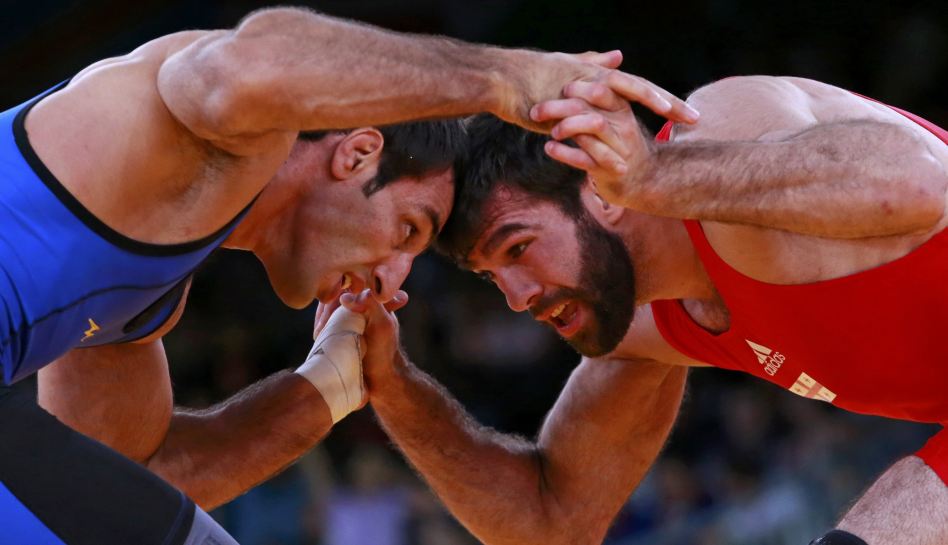
Tahmasebi locks up with Georgia’s Vladimer Gegeshidze at the 2012 Olympics. (Photo: Adrees Latif)
Everyone is really high on Zhan Belenyuk (UKR, world no. 1) coming in, which is natural. He’s young, humble, and hungry. He is also keenly aware (most of the time) where his body needs to be. Belenyuk has placed in the top three of the last dozen or so tournaments he’s been in, and that is just sick. He’s almost always dominant, though he has endured a few losses in there that at this point, you just have to chalk up to being anomalies. Chakvetadze hit him with a beautiful counter lateral-drop in the Golden Grand Prix final and then proceeded to beat the lemon-yellow piss out of him, so that was rather memorable. But for the majority of his Senior career, Belenyuk has definitely been the alpha-dog everyone else is chasing.
You don’t get blown away watching this guy wrestle, but that is a compliment. Belenyuk is simply the kind of athlete who always finds a way to get done what needs to get done. That’s it. He isn’t prone to being caught off-balance or in bad position, and also isn’t a plodder who is content to wait for his chances in par terre. He pitches complete games, is probably the best way to say it. Will he go lift? Hmmm, yeah, he’ll straddle up and then re-load at times. But usually, he just goes with where the waves take him, which means that if he is finding too much resistance and can’t maintain a lock, he’ll try to roll his guts.
So yes, if you’re wondering whether or not Belenyuk is a favorite to earn gold, he certainly is. Even if you’re new to all of this and don’t know who these guys are, Belenyuk passes “the eye test.” You can show a newbie a Belenyuk match and that person will be able to tell this guy is the real deal. Too much composure and confidence in what he has to offer. And while it’s not like he puts on laser-shows, it’s easy to tell he’s a wrestler who knows how to take control.
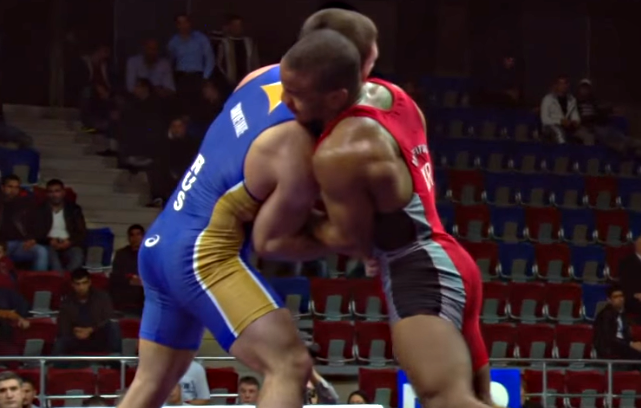
Belenuyuk (red) working against Davit Chakvetadze at the Golden Grand Prix.
Viktor Lorincz (HUN, world no. 2) seems like he’s about ready. He’s had tough matches and big wins over some of 85’s elite names and yet, still hasn’t found himself standing atop the podium at a major Senior event. Rio seems like as good a place as any to change that. There’s not a whole lot going on that he hasn’t been exposed to and at 26 years of age, Lorincz is in great position to ignite his career a step further. What you see out of Lorincz that you have to like is that he wrestles smart. He keeps his feet underneath him and like most Hungarians, is unafraid to take chances. It’s like he has a risk-assessment processor chip in his brain that tells him whether something is a good idea or not. Translation — he will try to throw you. Lorincz likes to weave his outside shoulder across and angle out to snatch arms or really, anything else he can grab a hold of.
The same attitude follows him to the mat. Lorincz lifts. For sure. But it’s not his wheelhouse. Instead, he likes a running-start gutwrench to get the ball rolling. Defensively, he is also a chore. Lorincz gets heavy as well as anyone here and pastes his hips like he’s Velcro’ing himself to the surface. That’s the game, isn’t it? Turn and not be turned?
The silly truth is that few people expect Robert Kobliashvili (GEO, world no. 8) to be a difference-maker on Monday, and that might be a mistake. Kobliashvili is really, only one of like three or four competitors at 85 kg who actually goes for scoring holds and hits them. (What more do you people want?!) Okay, at 23, he doesn’t have a distinguished resume sparkling with World-level titles. And sure, he has a “looseness” about his game that can work to his disadvantage. But he is strong, he is aggressive, and oh yeah, displays a fair collection of scalps on his mantle. The only thing that slows Kobliashvili down is that he sometimes slows down. He can wilt a little bit, so it’ll be interesting to see how he’s upped his conditioning since he qualified the weight for Georgia back in May.
How much of a factor will Georgian-born Russian Davit Chakvetadze (world no. 3) wind up being? Probably a big one. If anything, Chakvetadze is a slightly more polished version of Kobliashvili in that he’s another one who will open up. He had a career-defining win at the aforementioned Golden Grand Prix, where he beat up on World Champion Belenyuk and then overcame the legacy of Aleksey Mishin at the Russian Nationals in June. Chakvetadze is a man with a high-ceiling and at times, you see that the ceiling is very high. Other times, he has had performances that make you scratch your head, like at last September’s Worlds when he was torn up by Tahmasebi. Not that Tahmasebi is a guy Chakvetadze should automatically beat or something, it’s just to get run over like that is questionable. But good money says that his performance in Baku took some of the sting off, at least.
Rustam Assakalov (UZB, world no. 4) enjoyed a semi-surprising run to the finals of the 2015 World Championships, where he was ultimately blanked by Belenyuk. Since then, he hasn’t had the most inspiring run. He got tech’ed out of the Golden Grand Prix against Iranian understudy Mojtaba Karimfar and then failed to impress at the Pytlasinski Cup, when he had a legit chance to make some noise heading into Rio. But even still, Assakalov has some ammunition. He is dynamic once he gets a little momentum going and is as dangerous as they come from par terre. He has a sort of flying-open gutwrench at times; he get his lock, plants his outside foot, and then really pries the surface with his elbow to gain more of a roll. It’s a nifty little variation.
Normally, a guy who went to the World finals a year ago would be looked at as a major medal threat, but that isn’t the case right now with Assakalov. It’s not because he is a level below anyone here. It’s more that in Poland he looked underwater and since that’s our last memory of him, it is fuzzy to expect some stunning performance on Monday.
Oh yeah, Denis Kudla (GER, world no. 6) is kind of killer. Kudla brings a youthful edge to what is already a youthful weight class. A couple of years ago, the German stud was pounding out dudes on the age-group level and although it wasn’t easy, he has risen to the top of the field in his country. The 2016 Rio Olympics represent Kudla’s first Senior World-level event and while that makes him a pretty big underdog, he is still a problem. Why? Because even if he doesn’t advance far into the tournament, it’s a safe bet he takes out someone with higher billing, essentially paving the way for another wrestler to take it from there. That isn’t a diss, either. Kudla can catch fire and upset some people. Definitely. Is he going to wind up with a medal around his neck? Probably not. But that shouldn’t discourage anyone from watching him get after it.
Kudla is a charger and loves to find tiny cracks in his opponents’ defenses to explode through. If he gets in back of someone or to the side, he will definitely try to launch. He’s still young enough to where he thinks that’s how this works. One issue he has on the feet is that he is vulnerable to getting a case of “dinosaur arms.” He’ll be caught in between on occasion with his arms bent at 90 degrees but with no clear intent on what he’s going to do. When that happens, it isn’t all that difficult for a foe to upset his balance. From par terre, he’s a lifter first, a gutter second. His straight lift has actually been missing from his game a little bit on the Senior level, which is understandable.
What Provisor Brings
Even though he’s only 25-years old, Ben Provisor (USA) has already endured a career’s worth of up’s and down’s. He made his first Olympic squad in 2012 and seemed to be on the verge of a prolonged stay at the top domestically. And then his body started falling apart in bits and pieces. Necks, backs, elbows…it’s all a blur at this point. He’d return after an injury, perform well, and then something else would wind up becoming an affliction. It almost seemed as if he was snake-bitten. Not many athletes have been able to ride in a boxcar through hell and back only to return better than ever before, and it would seem that is where Provisor is currently at.
When Jake Clark shut him out at the Nationals last December, Provisor looked pretty good. He had a solid tournament up to that point and Clark was torching everybody. If not for the injury history, you’d have just taken it all at face value. So much for that.
Entering the Olympic Trials some four months later, Jordan Holm was seen as a wrecking machine. No one on US soil outside of Jon Anderson was coming too close to challenging the Minnesotan, so it’s no wonder why going into Iowa City, Holm, Clark, and Anderson were tabbed as the favorites with “Big Ben” wearing the “sleeper” label. Well, if he was ever asleep, he sure woke up in time for that thing. Provisor looked like a different person compared to the guy who had been on and off the shelf for the past three years. First off, he was virtually impossible to move. You just couldn’t do anything with this kid. His vast, tree-trunk legs pistoning forward, those arms and shoulders pushing, pulling, and prying for opportunities. Provisor was re-born into something else and whatever that was, it was too much for Holm or Clark to deal with when it mattered most.
Can Provisor Win?
If he had more recent matches under his belt outside of what happened in Iowa City, it would be easier to get a read on Provisor’s chances. The simple fact is that we haven’t seen what this new and improved version of Big Ben can do against international competition. That actually isn’t a bad thing. If he has the same fire and body mechanics he displayed at the Trials, there might be a few guys in this bracket who are in for a pretty big surprise.
Throw out the Ben Provisor you saw compete sporadically over the last couple of years because that guy doesn’t exist anymore. That’s saying something, because that Ben Provisor was still an elite competitor. When we say he’s been “remade”, it isn’t for high drama. Following the last of his litany of surgeries, Provisor began working with longtime coach Dennis Hall and Wisconsin-area personal trainer Joel Berens on a custom workout regiment that was designed to “re-wire” his body. These sessions not only accelerated Provisor’s recovery, but they also turned any and all of his strengths into superpowers. Consider that at 5’8, Provisor is especially short for 85 kilos. That isn’t a weakness. He is able to now use his center of gravity better to wear out opponents inside and make them carry his weight while he fights for positioning. He’s also become inexplicably difficult to turn and will probably be the faster guy on the feet against most he might be standing across from in Rio.
Throw in the fact that a) Provisor won’t be unnerved by the big stage since he’s been here before and b) he is absolutely itching to unleash his new gifts on the world, and what you have here is a real live contender who is going to pose a serious challenge to anyone standing in his way. So you ask yourself, But can he actually win? He can. Provisor isn’t the easiest pick of the four US representatives, but that’s only because he’s had to come back from the dead to make it back here. And really, who wants to bet against a guy like that?

Notice: Trying to get property 'term_id' of non-object in /home/fivepointwp/webapps/fivepointwp/wp-content/themes/flex-mag/functions.php on line 999

